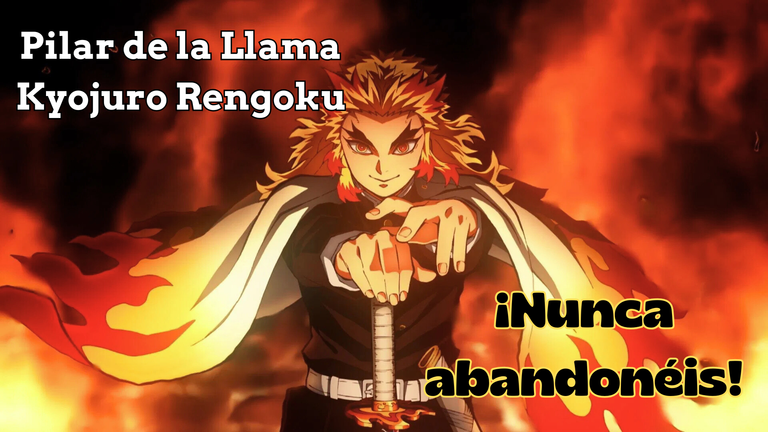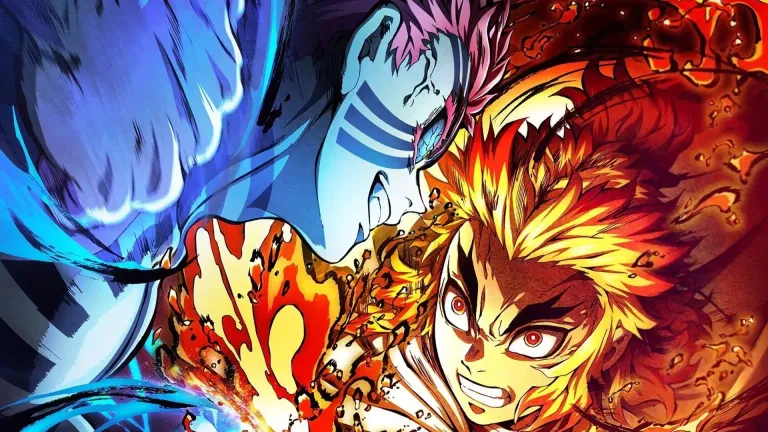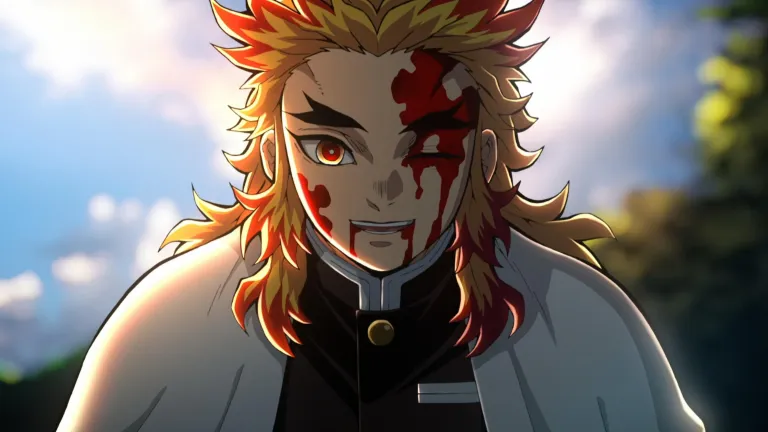

When Rengoku falls in combat, the episode reaches a level of intensity and emotion rarely seen in Demon Slayer. From the first moment, we feel the weight of his presence: his unwavering discipline, his smile full of sincerity, his phrase “Never give up!” resonates strongly. All this contrasts with the brutality of Akaza, the Upper Moon 3, and makes the scene take on an almost tragic dimension.
The battle is not only physical, it is a clash of ideals: Rengoku, with his inner flame and firm faith in protecting others, versus Akaza, who despises that human frailty and basks in his own strength. When Rengoku upholds the defense of the train and the passengers, his sacrifice is not a mere heroic act, it is the embodiment of his values: to protect without hesitation, even at the cost of his own life.
Versión español
Cuando Rengoku cae en combate, el episodio alcanza un nivel de intensidad y emotividad pocas veces visto en Demon Slayer. Desde el primer momento, sentimos el peso de su presencia: su disciplina inquebrantable, su sonrisa llena de sinceridad, su frase “¡Nunca abandonéis!” resuena con fuerza. Todo eso contrasta con la brutalidad de Akaza, el Upper Moon 3, y hace que la escena cobre una dimensión casi trágica.
La batalla no es solo física, es un choque de ideales: Rengoku, con su llama interior y su firme fe en proteger a otros, frente a Akaza, quien desprecia esa fragilidad humana y se regodea en su propia fuerza. Cuando Rengoku sostiene la defensa del tren y de los pasajeros, su sacrificio no es un mero acto heroico, es la encarnación de sus valores: proteger sin vacilar, aun al costo de su propia vida

The fight itself is very well choreographed. The sword movements, the fire effects, Rengoku's final attack against Akaza... everything is sublimely animated. In the climactic scene, when Akaza pierces his solar plexus, we see how he staggers, but remains steady. There, in the seconds before dawn, we want to believe that his spirit, his determination and his personal light are stronger than the enemy. And yet, the dawn comes: Rengoku falls, exhaling his last breath, knowing that he accomplished his mission. That scene, where he looks up at the sky with a mixture of relief and fulfillment, brings a lump to the throat.
The impact on Tanjiro is shattering. We cry with him. His cry breaks the silence. “Kyojuro was the true victor,” he says, as the demon escapes. It is the purest justification of his legacy: victory is not always leaving the enemy breathless, but that no one dies under your care . That ideal is conveyed to Tanjiro, Inosuke and Zenitsu, and to us as spectators.
Most painful of all, Rengoku was not a main character; he came and went in a very short span. But that didn't stop us from feeling him so close, thanks to his charisma, his humanity and his brief acts of kindness (the famous bento gesture, the advice to Tanjiro, the care towards his brother). His death hurts precisely for this reason: we met him on the run, but he left us an indelible mark.
Versión español
La pelea en sí está muy bien coreografiada. Los movimientos de espada, los efectos de fuego, el ataque final de Rengoku contra Akaza… todo está animado de manera sublime. En la escena cumbre, cuando Akaza le atraviesa el plexo solar, vemos cómo se tambalea, pero sigue firme. Allí, en los segundos previos al amanecer, queremos creer que su espíritu, su determinación y su luz personal pueden más que el enemigo. Y sin embargo, el amanecer llega: Rengoku cae, exhalando su último aliento, sabiendo que cumplió su misión. Esa escena, donde mira al cielo con una mezcla de alivio y cumplimiento, provoca un nudo en la garganta.
El impacto en Tanjiro es demoledor. Lloramos con él. Su grito rompe el silencio. “Kyojuro fue el verdadero vencedor”, dice, mientras el demonio escapa. Es la justificación más pura de su legado: la victoria no es siempre dejar al enemigo sin aliento, sino que nadie muera bajo tu cuidado . Ese ideal se transmite a Tanjiro, Inosuke y Zenitsu, y a nosotros como espectadores.
Lo más doloroso de todo es que Rengoku no era un personaje principal; apareció y se fue en un lapso muy breve. Pero eso no impidió que lo sintiéramos tan cercano, gracias a su carisma, su humanidad y sus breves actos de amabilidad (el famoso gesto del bento, el consejo a Tanjiro, el cuidado hacia su hermano). Su muerte duele precisamente por eso: lo conocimos en fuga, pero nos dejó una marca imborrable

And the music... I can't stop mentioning the music. That melancholic theme when the sword falls, that silence after his scream, the dawn turning red. Those auditory details amplify the tragedy. It makes us remember his words, “Keep going! Never give up!” Despite the pain, he wants us to go on.
In short, Rengoku's death is one of those scenes that stick with you. It was brief, intense, brutal and deeply moving. I cried not only for him, but for what he represented: the purity of sacrifice, the weight of responsibility, and the power of a flame that, though extinguished, continues to illuminate. That sad song that leaves us, that fire-tinged dawn, and Tanjiro's choked cry: all make this episode undoubtedly one of the saddest and most epic of the series.
Versión español
Y la música… no puedo dejar de mencionar la música. Ese tema melancólico cuando cae la espada, ese silencio tras su grito, el amanecer tiñéndose de rojo. Esos detalles auditivos amplifican la tragedia. Hace que recordemos sus palabras: “¡Seguid adelante! ¡Nunca os rindáis!” Pese al dolor, quiere que sigamos nosotros.
En resumen, la muerte de Rengoku es una de esas escenas que se quedan grabadas. Fue breve, intensa, brutal y profundamente emotiva. No solo lloré por él, sino por lo que representaba: la pureza del sacrificio, el peso de la responsabilidad y el poder de una llama que, aunque se extinga, sigue iluminando. Esa canción triste que nos deja, ese amanecer teñido de fuego y el grito ahogado de Tanjiro: todo hace que este episodio sea, sin duda, uno de los más tristes y épicos de la serie.

- miniatura editada en CANVA
- Fuentes tomadas de THEMOVIEDB
- Traducido DEEPL
- Miniature edited in CANVA
- Sources taken from THEMOVIEDB
- Translated DEEPL

